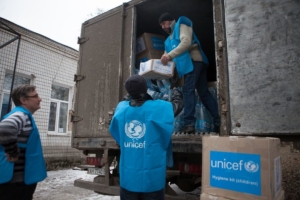UNICEF’s Work During COVID-19
 In June 2021, the United Nations Children’s Fund (UNICEF) released its annual report outlining the work done during the prior year. This year, the report focused on UNICEF’s work during the COVID-19 pandemic. While complete data on how COVID-19 impacted global poverty may never be available, what is available paints a dire picture. Compared to the baseline projection of global poverty prior to the pandemic, 2020 saw 144 million more people in extreme poverty. At least half of this rise “could be permanent.”
In June 2021, the United Nations Children’s Fund (UNICEF) released its annual report outlining the work done during the prior year. This year, the report focused on UNICEF’s work during the COVID-19 pandemic. While complete data on how COVID-19 impacted global poverty may never be available, what is available paints a dire picture. Compared to the baseline projection of global poverty prior to the pandemic, 2020 saw 144 million more people in extreme poverty. At least half of this rise “could be permanent.”
Beyond the immediate impact of families falling below the poverty line, the pandemic is also likely to impact growth. Without policy action, the pandemic may “trigger cycles of higher income inequality, lower social mobility among the vulnerable, and lower resilience to future shocks.
Despite the difficulty, UNICEF works hard to counter the negative impact of the COVID-19 pandemic. UNICEF is an organization under the United Nations with the express purpose of protecting children’s rights across the globe. The organization mainly focuses on helping children in some of the toughest places in the world. It supports “child health and nutrition, safe water and sanitation, quality education and skill building, HIV prevention and treatment for mothers and babies, and the protection of children and adolescents from violence and exploitation.”
The Impact of COVID-19
The pandemic touched nearly every part of the globe in 2020. Its impact worsened global progress toward reaching the U.N.’s Sustainable Development Goals. Progress was already off track due to a range of humanitarian crises, climate change and inequalities across the world. This led to 142 million additional children living in “monetarily poor households” in 2020. The pandemic led to about 15% of all children spending the majority of the year under stay-at-home orders. An estimated 94% of students were affected at some point by school closures. These disruptions caused the most harm to children living in poverty. At least one-third of students didn’t have access to remote learning, and food disruptions led to 44 million children facing hunger.
While absolute mortality appeared to be less of a danger for children, the effects of the virus had a negative impact on almost every key measure of progress. Disruptions to health services impacted children across the world. An estimated 80 million children under the age of one “may miss out on life-saving vaccines.” The pandemic and its secondary effects also led to a rise in abuse as disruptions to violence prevention and response services rose.
UNICEF’s Response
Despite these disheartening consequences, UNICEF’s work during the COVID-19 pandemic has not stopped. It has been working continuously to provide the necessary services to handle COVID-19. It also dedicates resources to responding to non-virus-related situations. This global crisis has highlighted UNICEF’s ability to adapt to new challenges and find new ways to help children living in poverty across the world. One way in which UNICEF’s work during COVID-19 had a large impact was its efforts toward providing necessary supplies and helping with the rollout of vaccines.
Throughout 2020, UNICEF provided “water, sanitation, hygiene services and supplies” for 106 million people. It also provided PPE to 2.6 million health care workers and training to an additional 4 million health care workers. UNICEF also worked with COVAX to make sure that vaccines were procured and distributed equitably across the world. UNICEF’s work to help children across the world extended to efforts not directly related to health care. The organization also used its leadership to reach more than 130 million children through its social protection initiatives and cash transfers.
Future Work
As the world moves forward, necessary work remains to help rebuild much of what the pandemic brought down. To this end, UNICEF’s work during COVID-19 continues. Executive Director Henrietta Fore laid out five goals for UNICEF to work on as nations rebuild and reimagine the systems children across the world rely on:
- Provide equal access to vaccines for all.
- Revolutionize learning through bridging the digital divide.
- Provide proper investment and attention to mental health.
- End discrimination.
- Address climate change.
The pandemic continues to have a massive impact on children across the globe. Not only did the virus directly affect millions, but it also shone a light on many already existing inequalities. UNICEF’s work during COVID-19 was vital and helped millions throughout the year. In the future, UNICEF will continue to work to improve the lives of children across the world.
– Taryn Steckler-Houle
Photo: Flickr
